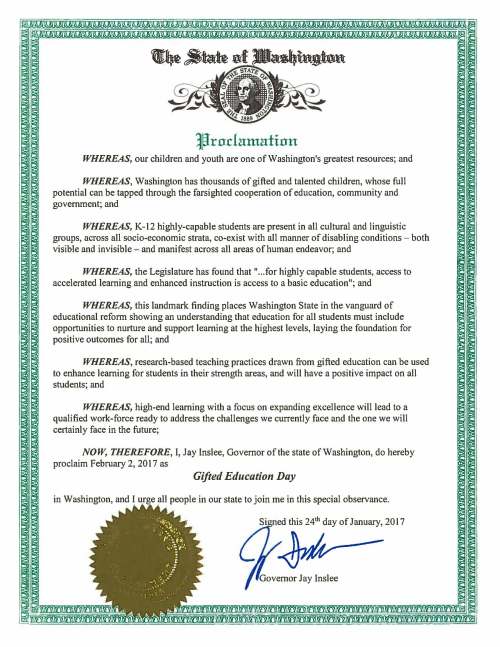Highly capable programs have been basic education since 2009. It’s past time for the Legislature to fulfill its obligation to these students, and today the House joins the Senate in missed opportunities.
While the Senate Republican budget proposal last week required a little study to fully decipher how highly capable funding and services would be affected, the House Democratic proposal is much harder to analyze. In our most generous interpretation, it’s incomplete. At worst, the House Democratic proposal completely overlooks the persistent and pervasive state level under funding of gifted education and provides only minimal maintenance level increases to state funding levels.
In 2018 and 2019 in their budget proposal (PSHB 1067), total state funding for gifted education remains essentially unchanged from status quo levels, allocating about $10.6 million in FY 2018 and $10.8 million in FY 2019. Districts are now prohibited from using local levy funds to cover costs of basic education as they’ve had to do for years, and this “maintenance level” funding will mean that students will see a catastrophic decrease in the amount of funding available to provide highly capable services. By our most conservative estimates that represents a cut of about $7 million annually from what was spent in the 2015-1016 school year, if everything else remained the same.
The problem is more complicated than that. Funding for highly capable services is based on a formula that involves the percentage of students eligible, a number of hours per week to be funded for each student, and an average teacher salary. That calculation arrives at an amount to be allocated to each district that they can use to provide highly capable services as they see fit. In a related bill referenced in their budget proposal (HB 2185), House Democrats are proposing no change to the percentage of students eligible, a slight increase in the number of hours per week to be funded, and an increase in average teacher salary.
Based on our rough calculations, that formula should drive about $17.7 million in gifted funding in 2017-2018, $22.4 million in gifted funding in 2018-2019 and 2019-2020, and $26.6 million in gifted funding in 2020-2021. Clearly, that doesn’t match up to what is allocated in their budget proposal.
At a minimum, the state needs to allocate an amount that covers the actual costs of providing highly capable services to the 63.5K+ actual identified students that districts have been paying with a combination of state dollars and local levy funds. To provide for improvements in the program that are essential to address issues of equity will require more. Providing the professional development necessary to build teacher capacity in the identification and service of gifted students costs money. Making changes to our referral and identification processes costs money. Providing services to all of the students who are identified costs money.
Right now, we’ll call this plan incomplete. If corrections are not offered soon, that incomplete could very quickly become a failing grade.




